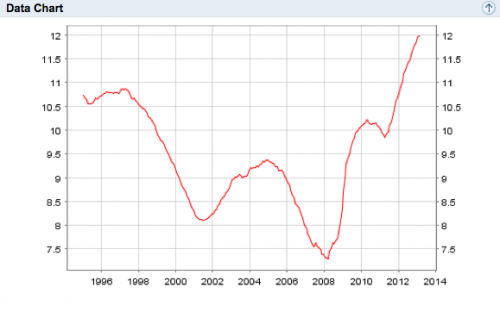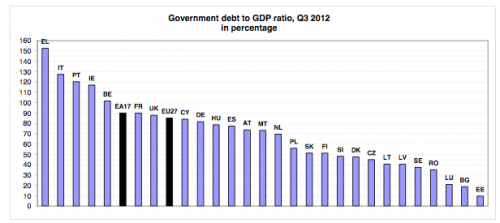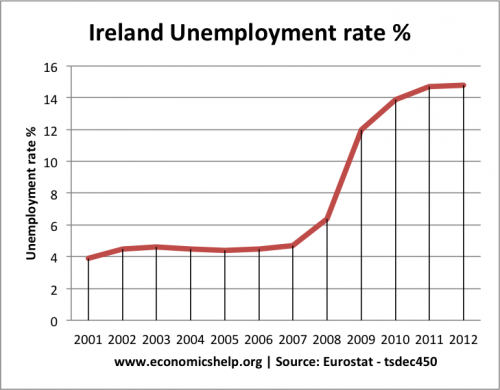Readers Question: How sustainable do you think that the austerity measured imposed on European countries are in economic and political terms?
This is a good question. Firstly, I feel there is a certain political appeal of austerity. See: Why is austerity politically popular?
When austerity was introduced, there was a reluctant support for austerity – because of the widely disseminated view it was necessary. However, as time passes and austerity appears to have given more pain than gain, the political support will continue to dwindle.
A politician promising to ‘get tough on debt’ has a certain political capital. A politician promising to bring in counter cyclical budget policies is (firstly, is very rare) and also likely to get ignored or mis-understood. There is growing criticism of austerity, but it is a rare to hear a politician talking about – targeting full employment, running a bigger cyclical deficit and / or monetising debt.
There are a few issues:
Unemployment is a marginalised political issue

In my opinion, unemployment is one of the greatest personal finance disasters and one of biggest economic / social problems facing society. It is not just a loss of income, but also a loss of self-esteem because you don’t have the opportunity to contribute to society. But, there never seems to be the same political urgency to tackle high unemployment. When the Coalition government was elected in 2010, the impression I got is that they were more concerned with reducing the budget deficit than tackling unemployment.
The ECB seem to live in a bubble where they define economic success as achieving an increasingly meaningless inflation target, budget deficit reductions and lower bond yields.
However, with unemployment rates in Europe continuing to increase, it may become a bigger issue amongst the electorate. If European policy makers don’t engage with the unemployment issue, there may be an increased gap between the unemployed and policy makers.
Austerity hasn’t worked
Generally, a temporary rise in unemployment and fall in GDP can be shrugged off. However, the problem with the austerity policies of the last few years, is that they have left Europe in continued difficulty. Even by a very narrow view – measuring success by debt to GDP targets, it has often failed (Austerity self-defeating). Some of the worse affected countries like Greece, Italy and UK are failing to stop the rise in debt to GDP.

But, in the bigger picture, austerity and monetary inflexibility are contributing to a significant double dip recession. Unemployment for 6 months is one thing, but a rise in long-term unemployment is much more serious.
The problem Europe faces is that it is hard to see where strong economy recovery is going to come from. With tight monetary, tight fiscal policy and fixed exchange rates, there is an inertia – preventing economic recovery and reducing unemployment. Even countries who don’t need to pursue austerity – Germany and Netherlands have embraced the trend for cutting spending. The consequence has been to push European growth lower. There is a real danger of a lost decade; we already have lost half a decade.
Social and political costs of long-term unemployment
There are significant costs of the long-term unemployment we are seeing. Firstly, unemployment is concentrated in certain deprived areas. It is also higher amongst young people. Certain cities are seeing youth unemployment of over 50%, the very real concern is that whole sections of the population will feel increasingly alienated from normal economic life. This level of unemployment can only exacerbate issues such as crime, racial tensions and political extremism.
One is always reluctant to make reference to Nazi Germany in any economics essay. But, it wasn’t the inflation of the 1920s, that led to Hitler’s rise. It was a period of mass unemployment. Mass unemployment was one of the most significant causes behind the rise of political extremism across Europe in the 1930s. Unemployment can create a sense of desperation. The rise of the neo-Fascist party in Greece ‘The Golden Dawn’ is related to the severe economic problems of Europe. As European countries remain stuck in economic stagnation, people’s patience will evaporate, as we see in Greece, Spain and Portugal.
Breakdown of European harmony
One of the saddest things about the Euro, is that a project designed to bring about greater European integration could actually have the opposite effect. It’s one thing, to implement economic pain on yourself. A bit like the UK – we have chosen to pursue austerity. The double dip recession is our fault. We can’t blame the ECB or EU fiscal rules. But, suppose we had been in the Euro. Undoubtedly we would have rising bond yields and we would have been forced by EU to implement even bigger budget cuts. We would have had an even deeper recession, but it would have been ‘imposed’ by a far off ‘European elite’ Britain is already very sceptical about Europe. But, when you have budget cuts imposed from outside – it creates a political disaster. Just look at how unpopular the IMF remain today because they imposed conditions on developing countries who wanted a loan. The previously strong political support for the EU is unsurprisingly falling in countries suck on the periphery.
The ECB has struggled to consider issue of unemployment, but even its critics would have to admit it is in a difficult situation. On the one hand, you have Germany worried about any inflationary pressures, on the other hand you have southern Europe drowning under deflationary pressures. The ECB have to try and reconcile very different regions within the Eurozone. At the moment, they are deciding the needs of the north take precedent. But, there are going to be countries very unhappy they are the ones bearing the burden of readjustment.
Things get better in the long-run.
The final point is that, even with inappropriate economic policies, economies are often remarkable versatile. Countries will eventually adjust to deflationary policies. There may be opportunities to export to growing economies in Asia and US. It’s not all doom and gloom, Europe is still a wealthy place.
The EU point to Ireland as a ‘successful’ austerity country. Certainly, Ireland has been rather resilient. But, it is really a success when Irish unemployment is still at 14%. It’s more concerning that the EU consider Ireland to be a success. If 14-15% unemployment is a success, what counts as failure?

The Euro remains an unknown experiment. We’ve never had such a combination of a single currency across so many diverse economies. In the 1930s, countries could and did leave the gold standard. The problem is that we are always told how difficult it is to leave the Euro. No matter how bad things get for Greece, they are always told, well it would be even worse if you left the Euro.
Related

1 thought on “How sustainable is European austerity?”
Comments are closed.